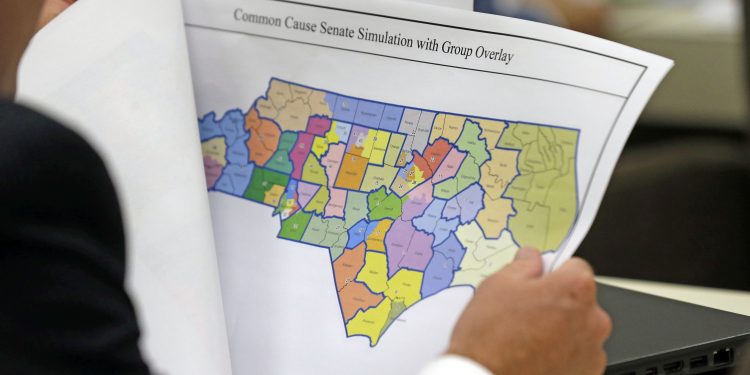Judges presiding over trials in North Carolina have rejected a lawsuit that challenged the redrawn legislative and congressional district lines. The lawsuit contended that the new district lines violated the constitutional right to “fair elections.” However, the judges dismissed the case, stating that the recent affirmation still stands. This means that decisions regarding redistricting policies are the responsibility of the General Assembly and not the courts.
On Friday, a panel of three Superior Court judges dismissed a complaint that was filed in January by a group of voters. The complainants aimed to prevent the implementation of redistricting, which they claimed would result in an unfair advantage for Republicans due to the creation of imbalanced preferences.
The state Supreme Court’s GOP majority made a ruling in 2023 that stripped the judiciary of the power to declare redistricting maps as illegal partisan gerrymanders. They firmly stated that the responsibility of redistricting falls under the political domain, and the judicial branch should refrain from intervening, except for instances where specific limitations are challenged.
During a recent court hearing, a lawyer representing voters argued that the 2023 decision was not relevant to their lawsuit, which asserts an implicit yet unspecified right to fair elections within the state’s constitution. The lawsuit references particular language in the constitution that emphasizes the need for frequent and free elections.
The argument put forth by Republican legislative leaders who were among the defendants in the lawsuit is supported by the order signed by Superior Court Judges Jeffery Foster, Angela Puckett, and Ashley Gore. According to the order, the outcome in this case is still controlled by the 2023 opinion of the Supreme Court.
According to the order dated Thursday, “The concerns brought up by the Plaintiffs are undoubtedly political in nature. There is no standard that can be identified or managed by the judiciary to address them, and the Panel’s decision would necessitate us to make policy decisions that are more suitable for the General Assembly, the governing branch of the government.”
The lawyers representing the plaintiffs have stated that they plan to file an appeal following the recent ruling. In a written statement, the attorneys expressed their concerns about the decision which they believe creates a preordained outcome for elections, and is therefore a threat to the democratic process in North Carolina. They also mentioned that the court does not have the authority to address the issue of legislative manipulation of voters. As of Friday, there has been no response from the spokespersons of state House Speaker Tim Moore and Senate leader Phil Berger.
Four lawsuits have been filed in North Carolina challenging the congressional and legislative boundaries drawn by the GOP-dominated General Assembly. These boundaries were created for use in elections until 2030 and are believed to favor Republicans electorally. One of the lawsuits is aimed at illegal racial gerrymandering and is still pending in federal court. The other three lawsuits are also pending and focus on similar claims.
In the lawsuit concerning “fair elections,” the focus is on a few specific districts. The three judges who presided over the case are all registered Republicans. Chief Justice Paul Newby, who is also a Republican and authored the decision in the 2023 redistricting case, is responsible for selecting the three-judge panels that hear these types of cases.

